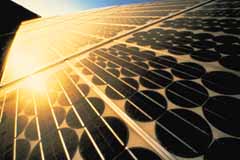
Advantages
Solar cells are long lasting sources of energy which can be used almost anywhere. They are particularly useful where there is no national grid and also where there are no people such as remote site water pumping or in space.

Image taken from www.bigfrogmountain.com without permission
Solar cells provide cost effective solutions to energy problems in places where there is no mains electricity. Solar cells are also totally silent and non-polluting. As they have no moving parts they require little maintenance and have a long lifetime. Compared to other renewable sources they also possess many advantages; wind and water power rely on turbines which are noisy, expensive and liable to breaking down.
Rooftop power is a good way of supplying energy to a growing community. More cells can be added to homes and businesses as the community grows so that energy generation is in line with demand. Many large scale systems currently end up over generating to ensure that everyone has enough. Solar cells can also be installed in a distributed fashion, i.e. they don't need large scale installations. Solar cells can easily be installed on roofs which means no new space is needed and each user can quietly generate their own energy.
Disadvantages
The main disadvantage of solar energy is the initial cost. Most types of solar cell require large areas of land to achieve average efficiency. Air pollution and weather can also have a large effect on the efficiency of the cells. The silicon used is also very expensive and the problem of nocturnal down times means solar cells can only ever generate during the daytime. Solar energy is currently thought to cost about twice as much as traditional sources (coal, oil etc). Obviously, as fossil fuel reserves become depleted, their cost will rise until a point is reached where solar cells become an economically viable source of energy. When this occurs, massive investment will be able to further increase their efficiency and lower their cost.